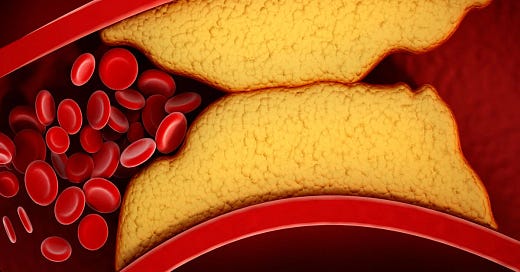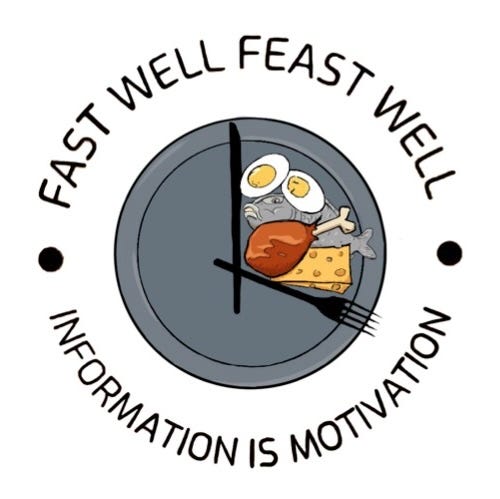Heart Disease Revisited: Risk Factors, Statins, and the Role of High Blood Cholesterol Levels
What causes cholesterol to stick to arteries? Do higher blood levels necessarily mean more accumulation in the arterial walls? What if everything you thought you knew about cholesterol was wrong?
(Note: back by popular demand, next Sunday evening (April 20) through Tuesday morning, we will be doing a group 36-hour fast. I got busy the past two weeks but the group fast is back on, including a group support chat and a Live Office Hours for paid subscribers. The Live will be Monday morning at 9 am Pacific/Noon Eastern. For directions on how to join a group chat click here, and for a Live click here. Send me questions by commenting on this post.)
My archive of old posts is getting quite long, so I’d like to occasionally point readers back to old posts I’ve done on popular topics. This week, I want to first summarize what I’ve written on heart disease. Then, you can visit the old posts if you want more in-depth info.
The central question in heart disease is how and why plaque builds inside arteries. I hope you have a clearer idea of the risk factors after reading this post and some old posts.
I frequently get questions about heart disease, statins, and cholesterol, and for good reason. According the CDC, heart disease is the leading cause of death in the US, and has been since the 1950s. So, of course, it’s important that we understand what causes heart disease.
Like many health related topics, there’s a mainstream view and there’s an alternative view.
I want to be clear from the outset that the battlelines do NOT line up with doctors, scientists, and researchers all holding one belief and crunchies, alternative health practitioners, and people who shop at farmers’ markets and don’t wear deodorant holding the other view.
Instead, there are doctors, researchers, PhDs, and scientists on both sides of the debate. (However, there are probably not as many people who don’t wear deodorant on the mainstream side, so we should factor that in. The aluminum in the deodorant may be affecting brain function.) 😉
Two Views of Heart Disease
Stated in the simplest terms, the older and mainstream paradigm believes that the level of LDL cholesterol in the blood is the major driver of heart disease, and particularly, atherosclerotic buildup in arteries. In other words, the more cholesterol that’s in the blood, the more blobs will randomly bump into the arterial wall and stick there.
The other paradigm believes that heart disease is much more complicated than mere LDL levels, and that the main drivers are inflammation from various causes, with high blood sugar, toxins, and high insulin all contributing. In other words, no matter how high or low the blood level of cholesterol, the body intelligently places cholesterol on a damaged artery.
One reason why the first theory, often called the lipid hypothesis since LDL is a lipid, is so popular is that it’s very simplistic, and people like simple.
Another reason why the lipid theory is so popular is because if it were true, then heart disease prevention could be bottled in a nice, tidy pill you take once a day.
But if heart disease is more complicated than just lowering your LDL level, then—darn it—you have to look at your lifestyle, what you’re eating, if you’re getting enough sleep, how high your blood sugar is, whether or not you’re exercising, how well you manage stress, and other painfully inconvenient topics. It’s all so complicated! And who wants that when you can simply pop a pill?
But here’s something to consider: if heart disease is caused mostly by high LDL cholesterol, and cholesterol-lowering statins are the most widely prescribed drug in the US (also, one of the largest-grossing drugs), why is heart disease still the leading cause of death?
It almost seems as though the statins aren’t working. Yes, they’re lowering LDL cholesterol quite neatly. But they don’t appear to be lowering heart disease.
Perhaps—but this is just a guess—heart disease is still the leading cause of death because we’re using the wrong model. 🤔
One of my great talents is to ask leading questions to mainstream-minded physicians and see how they’ll answer. So I like to ask this one: Does type 2 diabetes increase your risk of heart disease?
One very mainstream-convinced practitioner told me this (before he knew where I was going with the line of reasoning): nearly everyone with diabetes has some degree of heart disease. Hhm, if high blood sugar greatly increases the risk, that sounds a bit like the second paradigm to me.
Then I asked about other risk factors, and he said smoking. Remember, the second paradigm sees inflammation, high blood sugar, and toxins, such as from smoke, as major drivers.
So even the mainstream medical model understands that there is more to heart disease than just high LDL cholesterol. Yet, they prescribe statins like they’re the key to heart health.
Here are some posts that go in depth into the science behind this debate:
What Risk Factors Contribute to Heart Disease? (Hint: Not Saturated Fat and Cholesterol)
Insulin facilitates every single step along the inflammatory pathway that marks the progression of [heart] disease, including initiation, inflammation, foam cell (fat-laden cell) formation, fibrous plaque formation, and advanced lesions. Moreover, fibrous plaque contains insulin receptors, and insulin stimulates the growth of plaque, which accelerates the atherosclerosis and substantially raises the risk of cardiovascular disease.
In the above-linked article, I examine a study titled Basic Mechanisms of Diabetic Heart Disease published in the journal Circulation Research. This study carefully details the mechanisms by which high blood sugar and high insulin cause inflammation leading to atherosclerosis (the buildup of plaque inside arteries). This gives proof positive that LDL randomly bumping into the side of the artery does not cause plaque to build up. Instead, plaque serves as a bandage on an injured artery.
This information is important because people only have three groups of macronutrients to choose from, and one cannot just eat pure protein. Protein must be paired with either carbs or fats.
If we believe fats are bad for our hearts, we’ll be leaning into carbs. But the above article shows that too many carbs facilitate heart disease.
And how did this idea that eating fat and cholesterol cause heart disease get going anyway?
That’s what I tackle in this post:
The Skinny on Saturated Fat: It's Vital for Health and Doesn't Cause Heart Disease
Note: Nina Teicholz, who has an excellent Substack called Unsettled Science, spent 10 years researching and conducting interviews for her rigorous and compelling book The Big Fat Surprise: Why Butter, Meat, and Cheese Belong in a Healthy Diet which I just finished reading. This post is a summary of her research.
In the above-linked post, I tell the story of Ansel Keyes, a man who made a name for himself by bullying the scientific community into believing that saturated fat and foods with cholesterol cause heart disease. There was only one problem with his theory: it lacked robust scientific proof.
And finally, in this last post, I attack the holy grail of drugs, the darling of the pharmaceutical industry, the true sacrament of the church of our Lord and Savior Pfizer, the pill to save us all from our food sins, forged in the deep places of Mt. Doom by none other than Sauron himself, you either love it or you hate it, the first world’s most beloved drug, THE STATIN. (Looks a little like the word Satan, don’t you think? Kidding)
Statins: Detrimental to Health? You decide.
Happy Tuesday! It’s a wonderful day to learn about the importance of educating yourself about health, particularly when it comes to statins. After reading today’s post, I think you’ll agree that the more you know about sugar’s effects, the more motivated you’ll be to reduce it.
This post highlights a number of top-level doctors and researchers who all disagree with the idea that high blood levels of LDL cause heart disease. Over 100 of these medical and academic doctors feel so strongly about this that they formed an organization called THINCS, which stands for The International Network of Cholesterol Skeptics.
Although the members of this organization might have differing ideas on the exact mechanisms causing heart disease, they are unified on one point: high cholesterol is not the driver and statins are not the answer. Also, the above post features a meta-analysis showing that those with the highest LDL (yes, “bad cholesterol”) lived the longest.
Although it can be confusing to know who to believe when you don’t have all the information, the reason I love talking about this topic is because the more I study it, the more clear it becomes which side understands human physiology and which side just wants to make money by putting you on drugs for the rest of your life.
Choose for yourself, Leslie
Are you new around here? Welcome!
Allow me to show you around. I have some old posts you may be interested in.
I’ve organized my archives into two courses:
A Fasting Course that teaches you how to do intermittent fasting
And a Health, Nutrition, and Chronic Disease Course with modules
Here are a few additional posts from my archives that you might be interested in:
An Odd Cure for Incurable Cancer
How I Transformed My Health Part 1: My Intermittent Fasting Journey
If You're Looking for Health or Weight Loss Coaching, Here's the Lowdown
Here’s a link to my health and weight loss coaching page
The Day My Mom Almost Died: My mom almost died of COVID










Great topic today, I'm within a few days of 10 years since a heart incident. A trip to the ER, defibrillator and CPR, came back to life with a nurse on top of me doing chest compressions, screaming "your a lucky man ". I lost a ton of weight afterwards. Then covid, put some back on through that s--t show, then found your Fast Well Feast Well Substack. Lower weight now than I can even remember when. So thank you Leslie and company..... Looking forward to Monday's 36 hour, especially knowing there will be some feasting going on through this blessed Easter weekend.. 🙏🙏🙏
Grateful for your work.